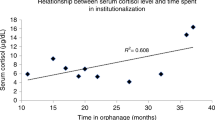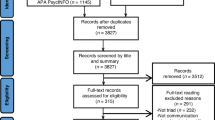Abstract
Our objective was to understand the parents’ perception of children treated in an ASCT unit. Parents (40) of children and adolescents were interviewed by the department psychiatrist-psychoanalyst, over 9 months. They expressed great distress (22), considerable difficulty in assuming their parental role (with feelings of helplessness and guilt), and had distorted relations with the child whose behavior was unusual and incomprehensible (22). The relation with care providers, who should be ‘all-powerful’ and harmless, was ambivalent (15). They found it difficult to think or refused to do so, because their ‘thoughts are terrifying’, and they wanted to forget everything (11). The couple was going through a crisis (9). Temporal landmarks were disturbed (8); ASCT was experienced as a threatening discontinuity in the course of treatment (parents were unable to think of the past, the future, or the present); social landmarks were disturbed (6) with loss of social and professional relations. We concluded that parents may experience intense distress and disorientation. Trained to understand the parents’ and their children's thoughts and behavior, the medical team, which includes a psycho-oncologist, can better help them to understand and support the children, to strike a balance between their parental role and other responsibilities, and prevent conflicts.
This is a preview of subscription content, access via your institution
Access options
Subscribe to this journal
Receive 12 print issues and online access
$259.00 per year
only $21.58 per issue
Buy this article
- Purchase on SpringerLink
- Instant access to full article PDF
Prices may be subject to local taxes which are calculated during checkout
Similar content being viewed by others
References
Matthay KK, Villablanca JG, Seeger RC et al. Treatment of high-risk neuroblastoma with intensive chemotherapy, radiotherapy, autologous bone marrow transplantation, and 13-cis-retinoic acid. Children‘s Cancer Group New Engl J Med 1999 341: 1165 1173
Hartmann O, Valteau-Couanet D, Vassal G et al. Prognostic factors in metastatic neuroblastoma in patients over 1 year of age treated with high-dose chemotherapy and stem cell transplantation: a multivariate analysis in 218 patients treated in a single institution Bone Marrow Transplant 1999 23: 789 795
Stuber ML, Nader K, Yasuda P et al. Stress responses after pediatric bone marrow transplantation: preliminary results of a prospective longitudinal study J Am Acad Child Adol Psychiatr 1991 30: 952 957
Dermatis H, Lesko LM . Psychological distress in parents consenting to a child's bone marrow transplantation Bone Marrow Transplant 1990 6: 411 417
Sormanti M, Dungan S, Rieker PP . Pediatric bone marrow transplantation: psychosocial issues for parents after a child's hospitalization J Psychosoc Oncol 1994 12: 23 42
Manne SL, Jacobsen PB, Gorfinkle K et al. Treatment adherence difficulties among children with cancer: the role of parenting style J Pediatr Psychol 1993 18: 47 62
Andrykowski MA . Psychosocial factors in bone marrow transplantation: a review and recommendations for research Bone Marrow Transplant 1994 13: 357 375
Neitzert CS, Ritvo P, Dancey J et al. The psychosocial impact of bone marrow transplantation: a review of the literature Bone Marrow Transplant 1998 22: 409 422
Felder-Puig R, Peters C, Matthes-Martin S et al. Psychosocial adjustment of pediatric patients after allogeneic stem cell transplantation Bone Marrow Transplant 1999 24: 75 80
Kronenberger WG, Carter BD, Stewart J, Morrow C . Psychological adjustment of children in the pretransplant phase of bone marrow transplantation: relationships with parent distress, parent stress, and child coping J Clin Psychol Med Set 1996 3: 319 335
Spinetta JJ, Jancovic M, Ben Arush MW et al. Guidelines for the recognition, prevention and remediation of burnout in health care professionals participating in the care of children with cancer: report of the SIOP Working Committee on psychosocial issues in pediatric oncology Med Ped Oncol 2000 35: 122 125
Weinberg A, Creed F . Stress and psychiatric disorder in healthcare professionals and hospital staff Lancet 2000 355: 533 537
Carpenter PJ, Le Vant CS . Sibling adaptation to the family crisis of childhood cancer. In: Bearison DJ, Mulhern RK (eds) Pediatric Psychooncology Oxford University Press: New York 1994 122 142
Houtzager BA, Grootenhuis MA, Last BF . Adjustment of siblings to childhood cancer: a literature review Support Care Cancer 1999 7: 302 332
Spinetta JJ, Jankovic M, Eden T et al. Guidelines for assistance to siblings of children with cancer: report of the SIOP Working Committee on Psychosocial Issues in Pediatric Oncology Med Pediatr Oncol 1999 33: 395 398
Die Trill M, Stuber Ml . Psychological problems of curative cancer treatment. In: Holland JC (ed) Psycho-oncology Oxford University Press: New York 1998 897 906
Koch U, Haerter M, Jakob U, Siegrist B . Parental reactions to cancer in their children. In: Baider L, Cooper CL (eds) Cancer and the Family John Wiley & Sons: Chichester 1996 149 170
Chauvenet AR, Smith NR . Referral of pediatric oncology patients for marrow transplantation and the process of informed consent Med Pediatr Oncol 1988 16: 40 44
Patenaude AF, Rappeport JM, Smith BR . The physician's influence on informed consent for bone marrow transplantation Theor Med 1986 7: 165 179
Kodish E, Lantos J, Stocking C et al. Bone marrow transplantation for sickle cell disease – a study of parents’ decisions New Engl J Med 1991 325: 1349 1353
Phipps S, Brenner M, Heslop H et al. Psychological effects of bone marrow transplantation on children and adolescents: preliminary report of a longitudinal study Bone Marrow Transplant 1995 15: 829 835
Holland J, Plumb M, Yates J et al. Psychological response of patients with acute leukemia to germ-free environments Cancer 1977 40: 871 879
Amato JJ, Williams M, Greenberg C et al. Psychological support to an autologous bone marrow transplant unit in a community hospital: a pilot experience Psycho-Oncol 1998 7: 121 125
Eiser C, Havermans T, Eiser JR . Parent's attribution about childhood cancer : implications for relationships with medical staff Child Care Health Dev, 1995 21: 31 42
Phipps S, DeCuir-Whalley S . Adherence issues in pediatric bone marrow transplantation J Pediatr Psychol 1990 15: 459 475
Spinetta JJ, Masera G, Eden T et al. Refusal, non-compliance, and abandonment of treatment in children and adolescents with cancer: prevention and resolution Med Ped Oncol 2002 38: 114 117
Masera G, Spinetta JJ, Jankovic M et al. Guidelines for a therapeutic alliance between families and staff: a report of the SIOP Working Committee on Psychosocial Issues in Pediatric Oncology Med Pediatr Oncol 1998 30: 183 186
Eden OB, Black I, Mac Kinlay GA, Emery AE . Communication with parents of children with cancer Palliat Med 1994 8: 105 114
Andrykowsi MA, Brady MJ, Hunt JW . Positive psychosocial adjustment in potential bone marrow transplant recipients: cancer as a psychosocial transition Psycho-Oncol 1993 2: 261 276
Oppenheim D, Simonds C, Hartmann O . Clowning on children's wards Lancet 1997 350: 1838 1840
Linn S, Beardslee WR, Patenaude AF . Puppet therapy with pediatric bone marrow transplant patients J Pediatr Psychol 1986 11: 37 46
Monteiro de Barros MC, Pot Mees C . Enhancing communication: understanding drawings of bone marrow transplant children EBMT-NG J 1994 56 58
Horsman J, Furlong W, Feeny D et al. The Monetary Costs of Childhood Cancer to the Families of Patients Chepa Working papers series, 94–9 McMaster University: Hamilton, Ontario 1994 p 54
Author information
Authors and Affiliations
Rights and permissions
About this article
Cite this article
Oppenheim, D., Valteau-Couanet, D., Vasselon, S. et al. How do parents perceive high-dose chemotherapy and autologous stem cell transplantation for their children. Bone Marrow Transplant 30, 35–39 (2002). https://doi.org/10.1038/sj.bmt.1703587
Received:
Accepted:
Published:
Issue date:
DOI: https://doi.org/10.1038/sj.bmt.1703587
Keywords
This article is cited by
-
Thoughts from the threshold: patient and family hopes, fears, values, and goals at the onset of pediatric hematopoietic cell transplantation
Bone Marrow Transplantation (2020)
-
Mind-Body Therapies in Childhood Cancer
Current Psychiatry Reports (2018)
-
Hematopoietic stem cell transplantation in children with cancer and the risk of long-term psychological morbidity in the bereaved parents
Bone Marrow Transplantation (2011)
-
Parental stress before, during, and after pediatric stem cell transplantation: a review article
Supportive Care in Cancer (2009)



